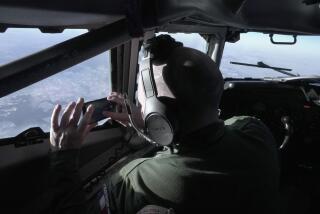In Georgia, a Russian plane mystery deepens
MOSCOW — The only thing that’s clear in the latest spat between Russia and Georgia, a former Soviet republic that aspires to join NATO, is that things are murky indeed. And someone is probably lying.
Officials of the small country in the Caucasus region said Friday that its forces had fired at a Russian plane that entered its airspace two days earlier, and that the aircraft may have subsequently crashed in a remote area.
Russia denied having had any aircraft in the region at the time and said it had lost no planes.
Things got more complicated Saturday.
The defense minister of Abkhazia, a separatist region of Georgia that is a de facto Russian protectorate, weighed in. He said he had seen a plane breaking up and falling. But he said he didn’t think it was a Russian plane, and he didn’t think Georgia had shot it down.
The whole story might merit a collective shrug if not for some serious policy implications.
Georgia was incorporated into both czarist Russia and the Soviet Union, and Moscow continues to view the country as part of its legitimate sphere of influence.
That attitude infuriates many of Georgia’s 4.5 million people, and relations have experienced sharp deterioration since a strongly pro-Western government came to power in 2003. Georgia hopes to follow formerly communist countries of Eastern Europe and Soviet Baltic republics into the North Atlantic Treaty Organization as soon as possible.
The country also serves as a transit corridor for a pipeline opened two years ago that carries oil from the Caspian Sea to the Mediterranean.
Abkhazia’s Defense Ministry at first vigorously denied Georgian media reports of the downing of an aircraft.
But in a dramatic about-face, Anatoly Zaitsev, chief of Abkhazia’s military general staff, told reporters Saturday in Sukhumi, the separatist region’s capital, that he had witnessed an aircraft breaking up in the air.
On Wednesday night, radar and army posts spotted an aircraft approaching from the Black Sea, Zaitsev said, according to the Russian news agency Interfax. He said he saw “an aircraft in the sky over the sea that was coming from the area of Turkey and was making no noise.”
“The aircraft was going down, a volley of bluish smoke was coming after it, and there were two large fragments flying behind its tail from inertia for a while.” He said that other military posts also saw a plane and then saw a blaze erupt in a mountain gorge.
But Zaitsev said he did not believe that Georgia shot down the aircraft.
“It was most likely a bomber or reconnaissance aircraft that was damaged for reasons that are so far unclear and fell in the mountains,” he said. “There was no fire at air targets either from Abkhazia or from Georgia that was registered at that time.”
The aircraft was unlikely to have been Russian, and “there are no aircraft of this type in the Georgian Air Force,” Zaitsev said, adding that it was possible the plane belonged to a NATO country.
If an aircraft did crash, it remained unclear whether it fell onto territory controlled by the Abkhazian separatist government or the Georgian central government in Tbilisi. Georgia sent a team Saturday to search for wreckage in territory it controls. It appeared possible that Zaitsev’s statement Saturday was intended to lay the groundwork for Sukhumi and Moscow to argue, if wreckage is found, that the airplane did not come from Russia.
Georgia accused Russia this month of sending two fighter jets into its airspace and dropping a missile. Georgian officials said the missile did not explode but created a deep hole in the ground as it broke into pieces. Georgian television showed video of missile fragments with Russian markings.
However, Moscow has said that the incident was a provocation designed by Georgian authorities to speed their country’s entry to NATO.
It appeared that the dispute over alleged Russian incursions into Georgian airspace may accelerate the linkage of Georgia’s radar systems with NATO’s network.
Georgian Deputy Foreign Minister Georgy Mandzhgaladze said Thursday at a news conference in Tbilisi that Georgia was ready to join NATO’s Air Situation Data Exchange Project. Linkage of the systems would make it easier for Western countries to confirm or refute allegations of air incursions in the Caucasus region.
“Joining the system will provide for automatic exchange of data collected by radar, and Georgia wants to cover the whole country, including Abkhazia,” Mandzhgaladze said. “NATO member states will receive our data, which will rule out the possibility of tampering.”
More to Read
Sign up for Essential California
The most important California stories and recommendations in your inbox every morning.
You may occasionally receive promotional content from the Los Angeles Times.










